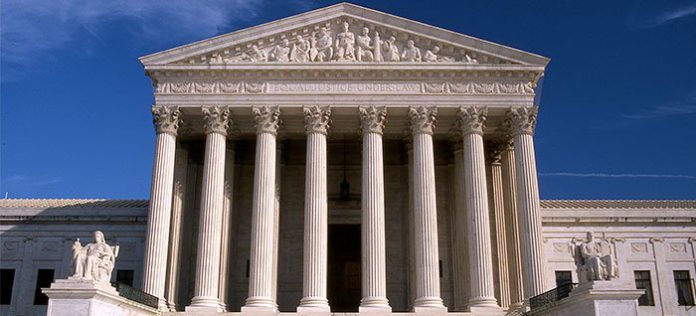
Do attorneys who carry out nonjudicial foreclosures meet the definition of “debt collectors” under the Fair Debt Collection Practices Act? The courts of appeals for the 4th, 5th and 6th circuits and the Colorado Supreme Court believe so. But the 9th and 10th circuits have said no. So the U.S. Supreme Court has taken up the question in Obduskey v. McCarthy Holthus LLP, and heard oral arguments Jan. 7 in the Colorado-based case that came to the court from the 10th Circuit.
Wells Fargo purchased the servicing rights to a mortgage Magnus Financial Corporation held for Dennis Obduskey’s home. Obduskey defaulted on the loan, and Wells Fargo’s counsel McCarthy Holthus initiated a nonjudicial foreclosure.
Obduskey received a notice from McCarthy in 2014. The notice had provisions similar to those sent by collectors that do fall under the FDCPA’s definition of a debt collector, such as Wells Fargo’s intent for a nonjudicial foreclosure and a statement that McCarthy may be a debt collector attempting to collect. But absent from the notice was any demand for Obduskey to actually make any payments on the debt.
Obduskey disputed the debt, which under the FDCPA’s protection pauses the foreclosure temporarily. McCarthy instead began another nonjudicial foreclosure proceeding. Obduskey sued McCarthy and Wells Fargo, but McCarthy got the case dismissed, claiming the FDCPA does not apply to nonjudicial foreclosures. The 10th Circuit agreed.
Obduskey’s arguing attorney, Daniel Geyser, said the plain language of the FDCPA supports covering nonjudicial foreclosures because they are attempts to collect debt, whether directly or indirectly. But a few of the justices seemed to find adopting such a broad argument troubling, not because they did not think it made sense, but because of their concerns that Geyser’s proposed reading of Section 1692a(6) would make part of it irrelevant:
“The term ‘debt collector’ means any person who uses any instrumentality of interstate commerce or the mails in any business the principal purpose of which is the collection of any debts, or who regularly collects or attempts to collect, directly or indirectly, debts owed or due or asserted to be owed or due another. … For the purpose of section 1692f(6) of this title, such term also includes any person who uses any instrumentality of interstate commerce or the mails in any business the principal purpose of which is the enforcement of security interests.”
Justice Samuel Alito first pointed out the conflict he felt Geyser’s argument created between the two sentences. “If a business whose principal purpose is the enforcement of security interests fell within the prior definition, the all-purpose definition, there wouldn’t be a reason for that provision,” Alito said. “So I think you’ve got a tough time explaining that away.”
Geyser said he believes the first and third sentences cover agents who both collect debts and enforce security interests — some agents do one or the other — and those who effect nonjudicial foreclosures belong in that class of agents.
Attitudes on the case among the justices did not seem to divide along partisan lines. Justices Sonia Sotomayor and Elena Kagan joined the more conservative justices in expressing doubt about Geyser’s theory.
Kannon Shanmugam argued for McCarthy Holthus, and Jonathan Bond of the Department of Justice also made an appearance to support the law firm’s position.
For foreclosures to fall within the scope of Section 1692f(6)’s first sentence, Shanmugam argued, there has to be a request for payment, which the notice sent to Obduskey by McCarthy did not contain.
“The very fact of the initiation of a foreclosure process is that it ordinarily represents a decision on the part of the creditor to stop seeking payment and instead to pursue an alternative remedy,” Shanmugam said. But several justices expressed skepticism about his black-and-white interpretation, saying a lender can use foreclosure as leverage to try compelling payment of the debt.
“It’s an alternative way to collect the debt if the debtor fails to do so. So how can it not be about payment of the debt?” Kagan asked.
The justices seemed reluctant to adopt a reading of the FDCPA that would result in striking down Colorado’s own law around debt collection. As Justice Stephen Breyer pointed out, Colorado’s law contains more protections for consumers than the federal statute.
Geyser attempted to resolve the conflicts brought up by the justices by saying the FDCPA only applies to professional debt collectors, not creditors, and he added Colorado law does not require a foreclosure to be carried out by a professional collector. But Kagan remained wary of Geyser’s argument to resolve the case by treating nonjudicial foreclosure agents as both collectors and enforcers of security interests.
“Do we say, notwithstanding that they look like debt collectors, we’re not going to treat them like debt collectors?” She asked. “Or do we say that, notwithstanding that they enforce security interests, we’re going to pretend that they don’t?”
— Julia Cardi

